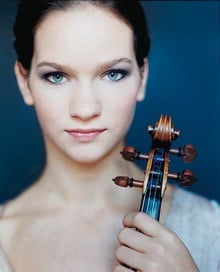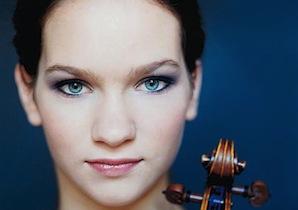
Known for her fearless and forthright performance of contemporary and classic violin repertoire, two-time Grammy winner Hilary Hahn seems equally earnest about all matters touching on her musical life. That extends to the commission project she announced at the beginning of this year, In 27 Pieces: The Hilary Hahn Encores, involving over two dozen contemporary composers, most of them new to the 31-year-old violinist. (About half of the resulting short creations will be included in Hahn’s Oct. 29 recital with pianist Valentina Lisitsa at the Mondavi Center.) Despite the demands of touring and recording, Hahn is also committed to maintaining a website where she reports in from the road, displays artwork donated by fans, and posts her own Skype interviews with collaborators, prominent among them Jennifer Higdon, composer both of one of the Encores and of a Hahn-commissioned, Pulitzer-winning Concerto. (Higdon’s Concerto, alongside another by Tchaikovsky, was recorded by Hahn and the Royal Liverpool Philharmonic Orchestra, on a Deutsche Grammophon release, named iTunes’ Best Classical Album of 2010.) SFCV began an interview with Hahn by asking her about interviewing.
Featured Video
Related Articles
Hilary Hahn Artist Page
Bio, Fun Facts, and Video
The Return of Hilary Hahn
February 7, 2011
Your latest split-screen Skype posting to your site is a conversation with a “Betta fish,” which is creating something of a buzz. But before we get into that, what prompted you to share your interviews with your own species?
Oh, that’s a good one. I grew up with NPR and I’ve always enjoyed people’s stories, almost more than talking about mine. And now I have a chance to speak with some very interesting people ... I want to give people a resource of what it’s like to work in music, what makes different people choose different things.
And some of your interviewees are composers from your Encores project?
Yes, I’m posting one a month. I’ve interviewed three already, and I’ve posted two of these — Bun-Ching Lam and Max Richter — and the third will go up next month, Søren Eichberg.
This seems an unusual set of commissions, and of course I’m wondering what you’ve been learning from them.
I have an overarching perspective on music of the past century that I would not have gotten otherwise.
They’re almost a genre in and of themselves. Most of the short pieces I’ve played in the past, I knew already from having heard them. But of these new pieces, only one is by someone I’ve worked with before, and that’s Jennifer Higdon. So I’ve found it’s much more than learning a few pages of music here and there; it’s trying to get the logic of the pieces into my head. And some of them are devilish to memorize, too. The composers all approach it differently and creatively, which is why I’m glad I’ll have the opportunity to interview most of them.
Hadn’t Jennifer Higdon been your teacher?
Yeah, I met her when I was 15, when she was one of my best teachers at Curtis [the Curtis Institute of Music in Philadelphia, which Hahn attended from ages 10 through 19]. She taught the 20th-century music history class, and I loved it, because in every single class we listened through almost the entire class, and she’d point out what each composer did that was groundbreaking. We had the facts on the board, but we were really tested on what we were absorbing. I think, because of that, I have an overarching perspective on music of the past century that I would not have gotten otherwise. So it’s nice to bring that full-circle, by working with Jennifer now.
And in effect, she’s now part of your acquiring, through the Encores, a rather overarching perspective on the current century.
It’s true, yeah. And it’s the first time I’ve worked on two commissions from me by the same composer [Higdon]. I didn’t expect to find it so familiar, but it really was. I used to think that when someone wrote something for particular performers, it would be illuminating to the performers, who would get a feel for what the person thought of their playing and what their strengths were. But when I was working on Jennifer’s Concerto, I realized she was writing things I didn’t yet know how to do. I realized that, when composers write for a performer, they’re not writing for how that person plays, they’re writing for what they want to hear that person play. And that’s really fun for me, because getting these pieces, there are some that just work immediately, but there are others I have to think a lot about.
And you’ll be introducing 13 of them at Mondavi.
If you’re playing, it’s really important to set aside what your preconceptions are and just get into the music.
Yes. The concert order is going to shift around, but there’ll also be Bach, Beethoven, and Brahms. I’m touring one-half of the Encores this year, I’ll tour one-half next year, and then I’ll release a recording of them. But of course, I’ll keep playing these pieces [as actual encores] and I look forward to other people playing them, too. There are also solo versions of some of the pieces. There are basically no limits for this project.
Just this week, we have a new recording of yours with Valentina Lisitsa, Charles Ives: Four Sonatas [on DGG]. My editor has been curious about your approach to the Ives — whether you were trying to turn listeners’ perceptions around, or just following your own convictions. I guess he considers the Ives a “tough sell,” so I’m wondering what sold the Ives to you.
That’s a really good question. I first heard the sonatas when I was looking for new recital repertoire, and I realized I hadn’t played much Ives, and I had no expectations. I like that, because I can just hear the music for what it is to me. The third of the sonatas is what I wanted to get started with, because it has more romantic elements; it’s stormier, just a really full-bodied piece. After performing it, I was really curious to play the other three, and one thing led to another. As for recording them, I find that reversing preconceptions is important before people hear the music. I do hope that people listening to the recording will hear something they haven’t heard before.
I know part of what my editor has in mind is that you may have a way of making difficult music sound approachable.
I hope that’s the case, but I don’t know that one piece is more approachable than another. The music is just there and it’s how you play it and how people hear it, based on their experiences with music, as well as what they’re going through on that day. If you approach music as “some things are friendly and other things are thorny,” it doesn’t do anything any favors. If you’re listening, there’s no obligation to do anything in particular, but if you’re playing, it’s really important to set aside what your preconceptions are and just get into the music and let the music show you what it wants to do, let it speak for itself.
Well put. I also consulted a string player, because I’m not one — a violist in Oregon — and she shared being impressed with your bow control.
You called a violist in Oregon? That’s amazing, you’re doing so much research. It’s terrific! [Chuckles] I do think about the efficacy of what I’m doing with my technique, but it’s a means to an end. The left hand does some of it, with vibrato, and determines the speed of the notes, but I think people would say that the bow has the greater proportion of influence on the emotional impact of the piece. So in order to get to that, and not do something you don’t need to do, it’s important to have a “grip” on your bow technique. [Chuckles]
The violist and I, by the way, are both curious about your split-screen interview with the Betta fish, which you posted last month. We wondered whether the fish is a metaphor for being a celebrity.
I enjoy seeing how people have interpreted it. I think because there’s so much silence in it [the fish’s responses are inaudible], it allows people to think about what they’re thinking
Kind of like the space in Japanese landscape paintings. How do you find the time to work on your website, and what does it do for you?
It’s both a resource and an outlet. It’s a resource for other people, because I was really fortunate, when I was a student, to know people who would take me backstage and introduce me to musicians, so I kind of had an idea about what I was getting into. But a lot of concertgoers don’t get that experience, and a lot of students are training for something that they don’t know what it becomes. So I try to provide that resource. And when I write for the website, I try not to have it be about me; it’s more about my experience of this lifestyle. As an outlet: I like to write, and it allows me to do things in a focused way.
You posted, while on tour, that you’re not all that enthused about travel.
I kind of have to pack my whole life, for however long I’m going, and it’s the packing that gets me. Everything else about it, I love.
Do you cook in hotel rooms?
I like to, yeah, when I can. I have some food allergies, so I have to be careful about what I eat. I just go to the grocery store and see what they have, and try to make something out of it. I really like domestic things, and being able to do something domestic on the road feels grounding. I can be checking e-mails, with a pot of soup boiling in the background. Or practicing, but knowing I’ll be having a homemade dinner later.
And you’ll be coming back out here to be with the San Francisco Symphony in the spring, right?
I’m so busy thinking about the Fall, I can’t see anything beyond December! [Chuckles] But I’m sure you’re right.

